Jana al-Issa | Hani Karazi
The increasing humanitarian needs of Syrians did not compel donor countries at the eighth Brussels Conference to mobilize financial pledges that meet these demands.
On the contrary, the financial commitments announced by donor countries in the conference decreased by 2.1 billion euros compared to the pledges announced in 2023.
This decrease in financial commitments came amid official European apathy towards the Arab wave of normalization with the Syrian regime and a European division regarding classifying Syria as a safe country to ensure the return of refugees.
In this report, Enab Baladi discusses with experts and specialists the reasons for the decrease in financial pledges at the European conference and the potential political shifts in the European stance, highlighting the political and refugee-related repercussions.
A European shift or apathy?
The decline in financial commitments at the Brussels 8th Conference on supporting the future of Syria and the region opened the door to questions regarding the European stance on the Syrian issue and the possibility of a shift or future change in its opposition to the Syrian regime.
Participating countries pledged 7.5 billion euros at Brussels 8th, a decrease of 2.1 billion euros from the 2023 pledges, which amounted to 9.6 billion euros.
This year, it was notable that the European Union reduced the financial aid amount compared to last year, despite remaining the top donor.
The European Union announced on its official website that it pledged 2.12 billion euros at the Brussels 8th Conference, while last year’s European pledges amounted to 3.8 billion euros.
The Syrian Negotiation Commission (SNC) criticized the supporting countries at the conference, and its President, Badr Jamous, commented in a Facebook post that “the basic needs of Syrians are far greater than the announced aid in Brussels, as the humanitarian, health, and educational situation worsens day by day.”
Meanwhile, the President of the opposition’s Syrian National Coalition (SNC), Hadi al-Bahra, stated that the promises made at Brussels decreased compared to previous years and are “far from fulfilling the real scope of humanitarian needs,” expressing hope that aid would reach its rightful recipients.
The decrease in European commitments was one of the indicators warning of a European shift away from the Syrian issue. While the European Union upheld its three “no’s” stance (No to normalization, no lifting of sanctions, no reconstruction) until a political solution is achieved, it simultaneously supports “early recovery” projects, suspected to benefit the Syrian regime politically.
Assaad al-Achi, Executive Director of the Baytna Syria Organization, told Enab Baladi that early recovery projects in Syria are not new; Europe has been supporting them since 2014 under various names like resilience support and stability enhancement. To this day, the EU continues the same approach under the “early recovery” term, not for reconstruction.
Al-Achi, who attended previous Brussels conferences, considered that the EU’s stance was very tepid regarding the early recovery fund recently launched by the United Nations, fearing that the regime would exploit this fund for its agendas and reconstruction, which means Europe is committed to the three “no’s,” in his opinion.
Al-Achi sees no indicators of a European shift from the Syrian issue but rather impatience due to the Syrian regime’s obstinance and its lack of serious political engagement after over 13 years since the Syrian revolution began.
In mid-April, the UN announced its intention to launch a special fund for early recovery in Syria to implement projects in several sectors before the next summer, with these projects financed by non-traditional donors such as Gulf countries.
UN Coordinator for Humanitarian Affairs in Syria, Adam Abdelmoula, previously told Enab Baladi in an email that the fund’s administration should be outside Syria to protect the “early recovery” from any political exploitation.
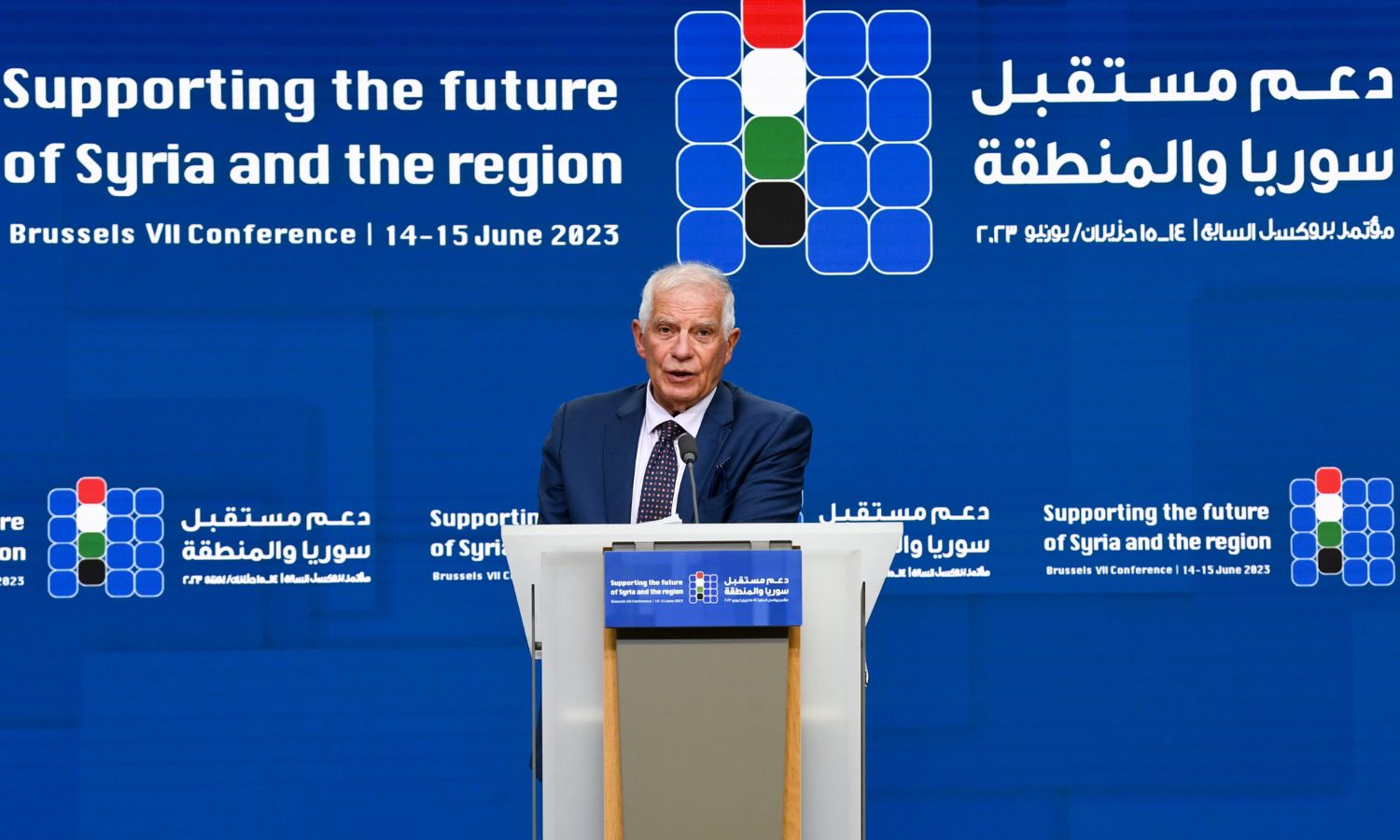
High Representative of the European Union for Foreign Affairs and Security Policy, Josep Borrell, during the Brussels Conference – May 28, 2024 (EU)
Insufficient pressure
Mahmoud al-Hussein, a Syrian researcher with a Master’s degree in conflict management and humanitarian work, told Enab Baladi that the European Union’s stance on the Syrian crisis was clear regarding Syria being unsafe for refugee returns or the need to increase aid for urgent needs.
Al-Hussein sees a problem in the EU stance due to a lack of pressure to reach a political solution, with current policies focusing on containing and managing the conflict within Syrian borders only, fearing a new refugee wave towards Europe.
The division in Europe over the Syrian refugee issue arises from internal reasons in countries like Italy, Austria, and Cyprus, trying to revive relations with the regime or assessing Syria’s safety for refugee returns due to the rise of right-wing parties in power.
A chance for a solution
There is no consensus within the EU regarding the situation in Syria. Eight member states (Austria, Czech Republic, Cyprus, Denmark, Greece, Italy, Malta, Poland) call for reassessment to allow for “voluntary” returns of refugees to their homeland.
However, this minority does not seem able to convince the remaining member states to change their stance on the Syrian refugee issue, as evidenced by the final declarations of the Brussels Conference. While the reduction in European financial pledges will increase Syrians’ suffering, according to Syrian-Canadian academic Faisal Abbas Mohammad, who holds a Ph.D. in Middle Eastern Studies.
Mohammad told Enab Baladi that the relative American-European silence on the official Arab normalization efforts with the Syrian regime might give this process a chance, although this Western stance has not translated into explicit endorsement of the normalization.
He believes that the reduction in commitments could be due to several factors, including European impatience and waning enthusiasm for an ongoing “crisis” beyond their expectations.
The EU increasingly relies on parallel aid tracks, essentially financial incentives resembling bribes to some regional regimes (Lebanon, Egypt, Libya, Tunisia) to limit refugee flows into Europe, regardless of the inhumane methods these countries use with refugees, as expressed by Mohammad.
This reduction in financial support might be a European pressure tactic on the American ally and “friends” in the Arab region to show more seriousness in ending the Syrian conflict and ensuring refugee returns.
It can also be inferred from Foreign Affairs Coordinator Josep Borrell’s explicit call directed at the United States and its Arab allies to use their political influence as an attempt to give a new impetus to the political process in Syria.
Faisal Abbas Mohammad, Syrian-Canadian Academic
American stance leading European policy
The possibility of a European shift regarding the Syrian issue cannot be isolated from the American stance, which began to change over the past years. A pivotal moment in this change was when James Jeffrey, the special envoy for the US Secretary of State to Syria, stated in 2018 that the United States was not seeking regime change in Syria but was interested in changing its behavior first.
The European Union was keen to align with the American position on Syria. In 2021, the EU adopted the same American stance emphasizing the need to change Bashar al-Assad’s behavior rather than changing the regime itself.
During the fifth Brussels Conference, the EU’s foreign policy chief, Josep Borrell, stated that the Syrian regime must take a clear decision to change its behavior and its interaction approach with the rest of the world, as he mentioned in an interview with Asharq Al-Awsat newspaper.
The change in the American stance towards the Syrian regime became clearer when President Joe Biden froze the Anti-Normalization Act with the regime despite its approval by the House of Representatives last April.
Syrian journalist and writer Ibrahim Hamidi stated in an opinion piece for Al-Majalla magazine, discussing the US stance on the Syrian issue, that Middle East official Brett McGurk does not want to “tie his hands” in negotiations with Damascus and does not want to interfere with the choices of America’s allies. Therefore, he intervened on behalf of President Biden to prevent the passage of the Anti-Normalization Act with the regime.
Hamidi’s article pointed out the existence of a European division regarding engagement with Damascus. While several countries, such as Italy, Cyprus, and Greece, have taken additional steps towards diplomatic normalization with the regime, there was a hardline stance from France, Germany, and Britain towards al-Assad, reflected in the ongoing trials of Syrian officials in Europe. However, the winds of normalization with al-Assad are blowing in various directions, to the extent that the US and European countries no longer obstruct communication channels with Damascus.
In this context, the director of the Syrian Justice and Accountability Center (SJAC), Mohammad al-Abdallah, said that since Biden took office, the American position on the Syrian issue has started to decline, but this decline is not due to a change in Washington’s position on al-Assad. Instead, it is because other priorities emerged, such as Ukraine. Additionally, the United States no longer finds the Syrian issue very costly or beneficial since handling this issue requires political capital and pressure on the regime or its allies, alongside coordination with Russia, which has become difficult after the war in Ukraine. Thus, the US found that it was not prepared to make concessions for the Syrian issue.
Al-Abdallah added that after the failure to reach a political solution and the changing balance of power on the ground, the European Union, without direct American involvement in the Syrian issue, would not be able to support the Syrian cause through military action, political pressure, or negotiations to bring about political change.
Therefore, with the American stance declining towards Syria, the European Union no longer has more leverage than the United States. Consequently, this position somewhat reflected on the Brussels Conference’s commitments and contributed to their decline, according to Al-Abdallah.
European division on refugees
Signs of European withdrawal from the Syrian issue were also evident in the way it handled the refugee issue, as some European countries began classifying areas in Syria as “safe” to deport refugees to their country and not accept their residency applications.
Last May, the governments of eight EU member states called for reassessing the situation in Syria to allow for the “voluntary return” of Syrian refugees to their homeland, according to the Associated Press.
Austria, the Czech Republic, Cyprus, Denmark, Greece, Italy, Malta, and Poland agreed to reassess the “safe areas” in Syria to find “more effective ways to deal” with Syrian refugees trying to reach the EU, during a migration conference held in the Cypriot capital, Nicosia.
Cyprus, which chaired the conference, warned that the return of refugees would initially be on a voluntary basis but could develop into forced returns later on.
This agreement came the day after 15 EU member states called for enhancing partnerships with countries along migration routes to avoid attempts to reach Europe.
In mid-May, Austrian Interior Minister Gerhard Karner considered Latakia governorate “safe” and proposed deporting Syrian refugees there in the future, during an interview published by the Austrian site Welt.
Karner, a member of the ruling People’s Party, said that EU interior ministers began discussing returning Syrian and Afghan refugees to their countries of origin.
The minister pointed out that in the case of Syria, “I would go further. For example, Latakia governorate is considered completely safe. Why not return Syrians there in the future? There should be no false taboos.”
Austria’s step followed Denmark, which decided in 2021 to withdraw residence permits for about 100 Syrian refugees and demanded their return to their country, claiming that Damascus had become a “safe” city.
In March 2023, Latakia was added to Damascus on the list of safe areas in Syria, according to a decision confirmed by Danish authorities, aiming to expand the “safe zones” to return Syrian refugees, raising concerns for the United Nations Refugee Agency.
The European shift regarding the refugee issue also manifested in a series of new decisions by the EU, including the trend towards accepting migrants as workers rather than asylum seekers.
The Federal Council in Germany approved the law for further development of skilled worker immigration on July 7, 2023, to be implemented in June 2024.
German Chancellor Olaf Scholz confirmed the importance of Germany actually obtaining skilled labor, adding, “We need the most modern skilled labor immigration law in the EU. If people have professional experience or personal potential, we will enable them to gain a foothold in our labor market,” as mentioned on the German federal government website.
The German government revealed its ten-point plan in November 2023 to address the increase in refugee numbers through tightening migration policy measures, including restricting financial aid provided.
Impact on neighboring countries
The reduction in financial commitments at the Brussels Conference will not please Syria’s neighboring countries, which host the largest number of Syrian refugees, in Lebanon, Jordan, Turkey, Iraq, and Egypt.
The decline in commitments has come amid instability faced by refugees in these countries, along with economic inflation and multiple financial crises endured by these nations, which some might attribute to the number of refugees that surpasses the host country’s capacity.
Amid systematic campaigns conducted by these countries aiming to forcibly deport them, in light of doubling hate speech, they might be driven to return to Syria to escape these pressures.
Officials from these countries brought their messages regarding refugees to the Brussels 8th Conference, raising complaints about the increasing pressure due to the presence of Syrian refugees.
Jordanian Foreign Minister Ayman Safadi stated that his country will no longer be able to continue providing services to Syrian refugees, including educational services for their children.
Lebanese Foreign Minister Abdullah Bou Habib also suggested transferring Syrian refugees to a third country, in a statement coinciding with escalating harassment, pursuit, and forced displacement campaigns against these refugees.
The reduction in financial aid will exacerbate the suffering of Syrian refugees on economic, humanitarian, and security levels in the host countries, and give further justification to the officials in the neighboring countries to increase restrictions on these refugees and pressure them to return, where they would face a certain fate at the hands of the Syrian regime, according to Syrian-Canadian researcher Faisal Abbas Mohammad.
Syria first, Grants surpass 2023 commitments
A financial tracking report issued by the European Union in May 2024 showed that during the past year (from June 2023 to December 2023), international donors at the seventh Brussels Conference contributed 5 billion euros for 2023 for Syria and the region’s countries most affected by the Syrian crisis (Jordan, Lebanon, Turkey, Iraq, Egypt), achieving 109% of the original conference commitments, which were 4.6 billion euros at that time.
Concerning the commitments monitored since last year for 2024, the granted commitments amounted to 1.3 billion euros, an additional figure above the set and allocated amount of 1 billion euros.
Meanwhile, 2 billion euros were provided in the form of loans for 2023 and beyond, meeting 52% of the original commitment in the form of loans to the governments of the host countries for refugees.
Among the supported countries, Syria received the largest share of the contribution for 2023, amounting to 2 billion euros. Syria also benefited from 68 million euros as a grant for 2024 and beyond.
Lebanon received the second largest amount of grant contributions for 2023, amounting to 938 million euros.
Turkey received 892 million euros in grant contributions for 2023, and Jordan received 667 million euros for 2023, with the largest number of grant contributions for 2024 and beyond, amounting to 675 million euros.
Meanwhile, Egypt received aid in 2023 worth 82 million euros, which exceeds three times the conference’s scheduled commitment for Egypt, amounting to 25 million euros.
Syria outside international priorities
Despite the overall and particularly European decline in international financial commitments this year at the Brussels 8th Conference, the European Union’s Foreign Policy Chief, Josep Borrell, said in a press statement that the European Union stands by the Syrian people and their host communities, and there is no doubt that the terrible challenges facing the region today cannot divert its attention from continuing to push for a political solution, in line with Security Council Resolution 2254.
The Associated Press commented on the decline in donor commitments this year as an indicator of continued donor fatigue, as the world’s attention is focused on conflicts elsewhere, including the wars in Ukraine, Sudan, and Gaza.
Mohammad al-Abdallah, director of the Syrian Center for Justice and Accountability, believes that the commitments at Brussels have decreased due to other global issues that have pushed the Syrian file a step back on Europe’s priority list, foremost among them the Ukraine war, which has cost a lot financially to provide military and relief support, along with the expenses incurred by the European Union to host Ukrainian refugees.
Al-Abdallah added to Enab Baladi that the Gaza war has become one of the prominent issues overshadowing Europe’s priorities, which will likely play a major role in the reconstruction of Gaza, alongside other issues such as hosting Afghan migrants heading to the United States and Europe, and a wave of migration from most countries with conflicts to the European Union.
Assaad al-Achi, director of the Baytna Syria Organization, also spoke about the reasons for the decline in donor commitments this year, saying that after more than 13 years since the Syrian revolution, there are pressures on donor countries from their citizens and taxpayers to focus on more urgent issues than Syria, including Ukraine, as it is a European country, thus making Kyiv alongside Gaza more of a priority than Syria.
Al-Achi pointed out that the decline in donors providing support to Syria this year was expected, with successive crises worldwide, but holding the conference itself is considered an achievement under the current international circumstances, in his opinion.
Al-Achi added that the European Union learned from the Gaza lesson, after finding that freezing the conflict was a wrong idea, and that it should have addressed the roots of the conflict there before it exploded in October 2023. In light of that, Europe will continue to pay attention to the Syrian issue, as it knows that abandoning support for this issue politically and financially will cause the situation there to explode, as happened in Gaza, possibly generating a large wave of asylum to Europe and other catastrophic consequences.
Syrian researcher with a master’s degree in conflict management and humanitarian work, Mahmoud al-Hussein, told Enab Baladi that the decline in financial commitments is due to several reasons, the most prominent of which is that the humanitarian crisis in Syria has become, in the eyes of donors, a complicated crisis despite the worsening situation year after year, due to the political stalemate in the country.
Al-Hussein pointed to the donors reaching a stage of “donor fatigue” due to the emergence of international crises and new priorities, imposing a reduction in support for a crisis due to international political interactions.
if you think the article contain wrong information or you have additional details Send Correction
النسخة العربية من المقال
-
Follow us :
Most viewed
- Al-Sharaa and Abdi reach agreement on merger of SDF into Syrian state
- Did Syrian state fall into coastal ambush?
- Syrian Defense Ministry appoints "Abu Amsha" as Hama Brigade commander
- Al-Sharaa sets steps to overcome Syrian coast’s bloody events
- 311 casualties among government forces and civilians in Syrian coast












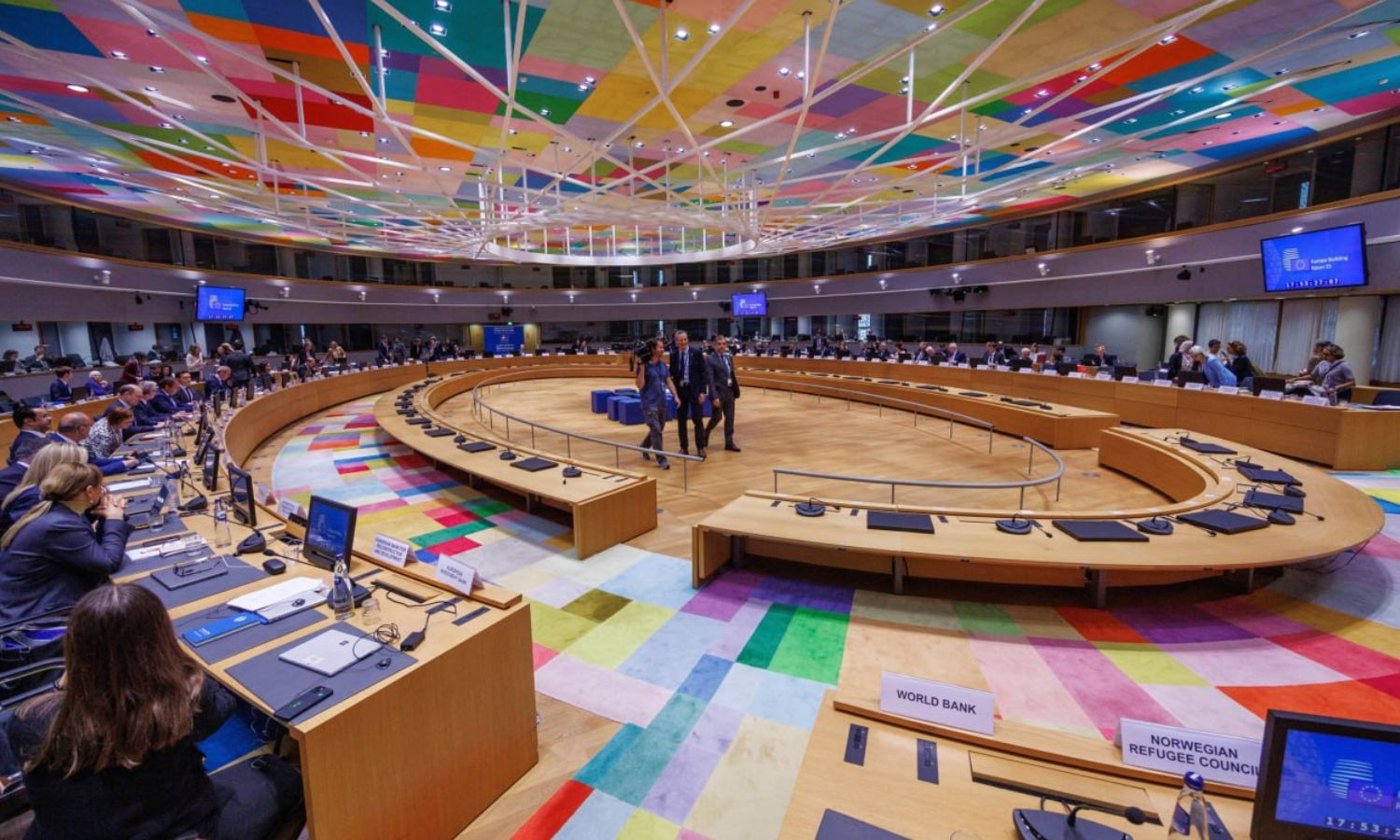
 8th Brussels Conference on Supporting the Future of Syria and the Region at the European Council in Brussels - May 27, 2024 (EPA)
8th Brussels Conference on Supporting the Future of Syria and the Region at the European Council in Brussels - May 27, 2024 (EPA)





 A
A
A
A
A
A
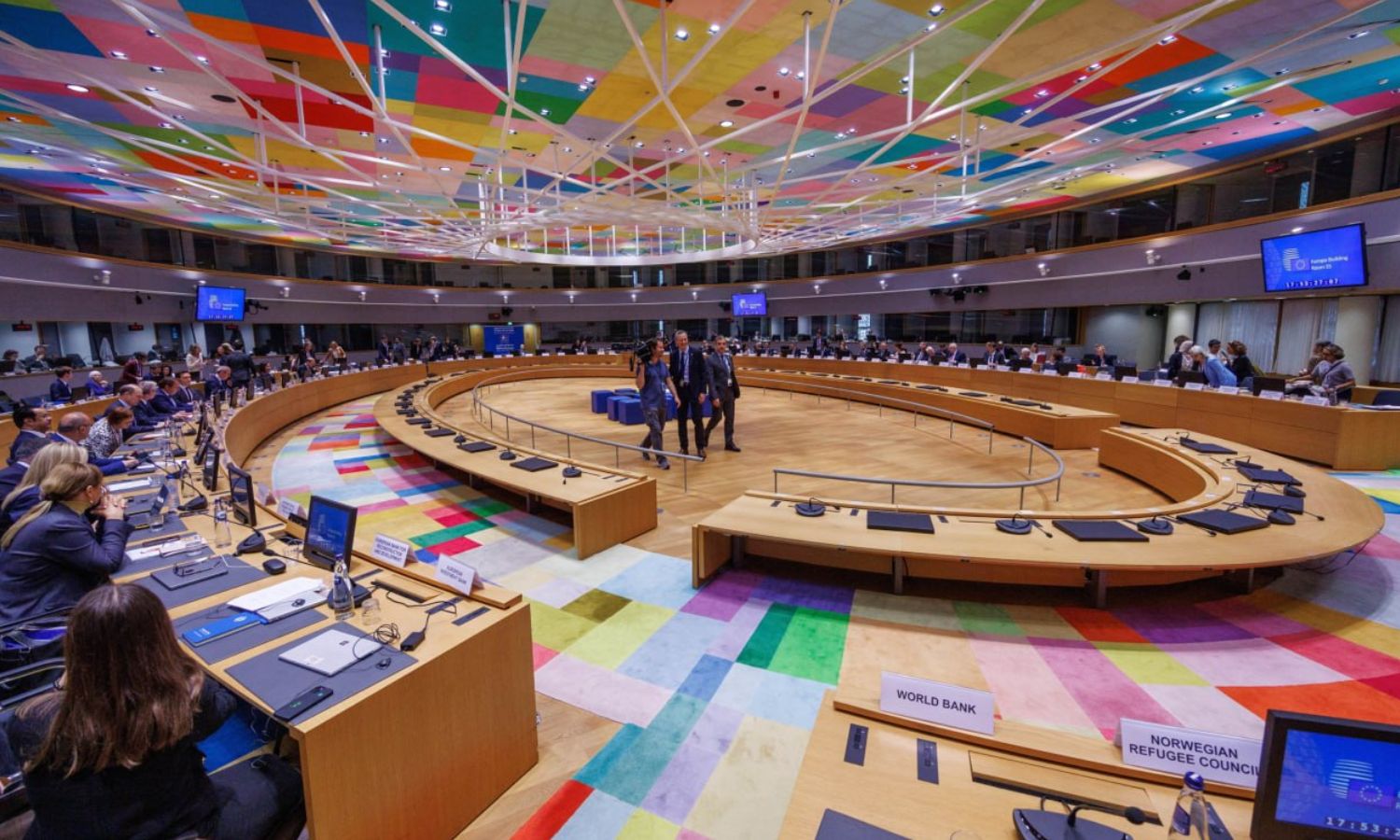
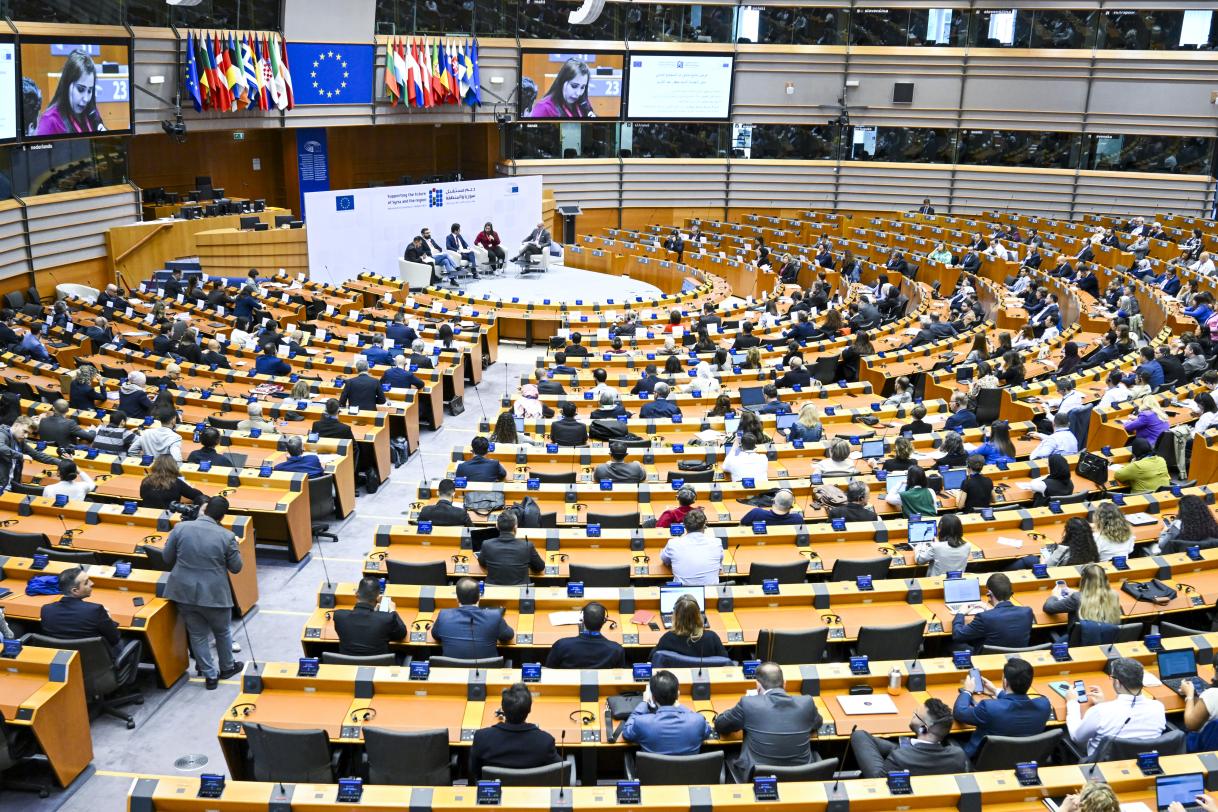
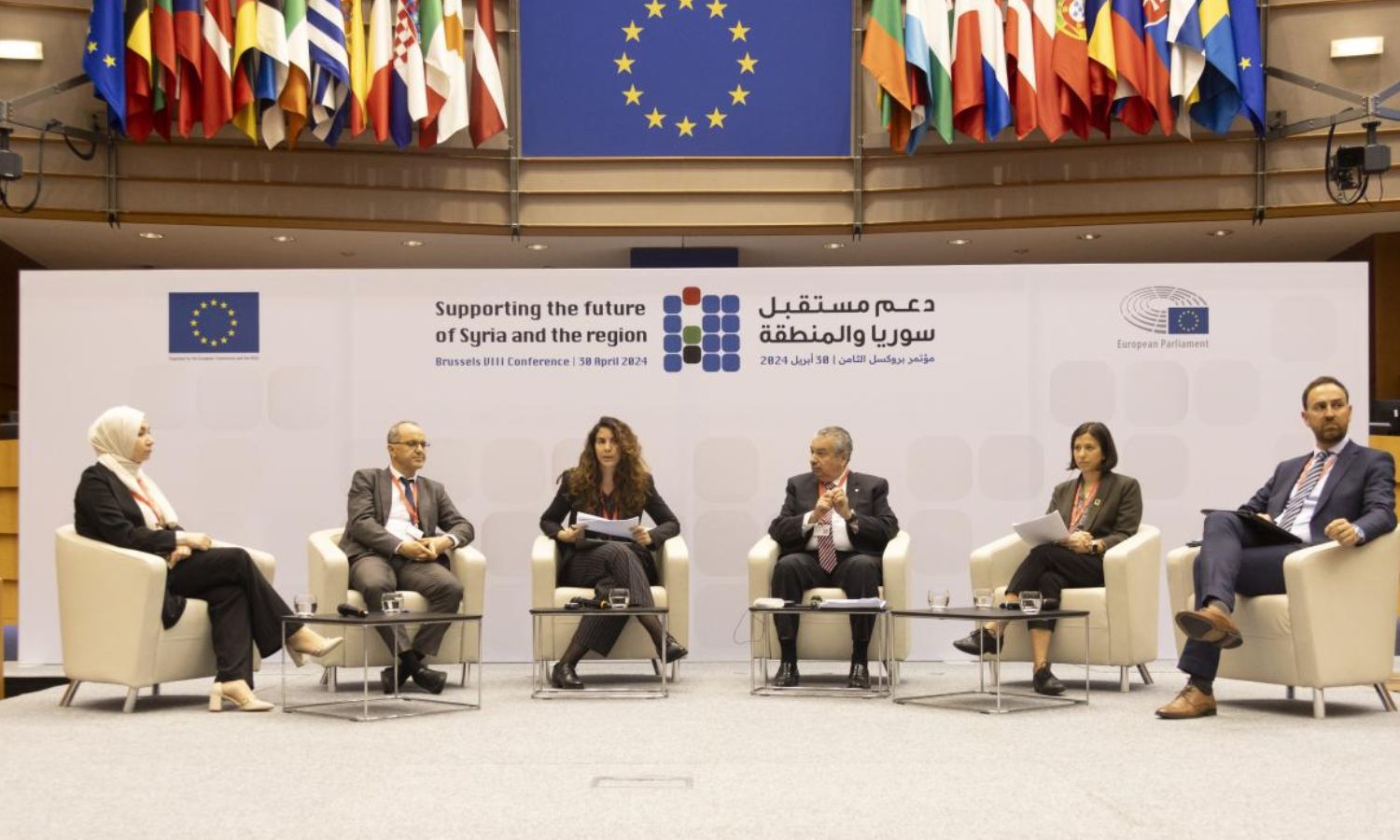
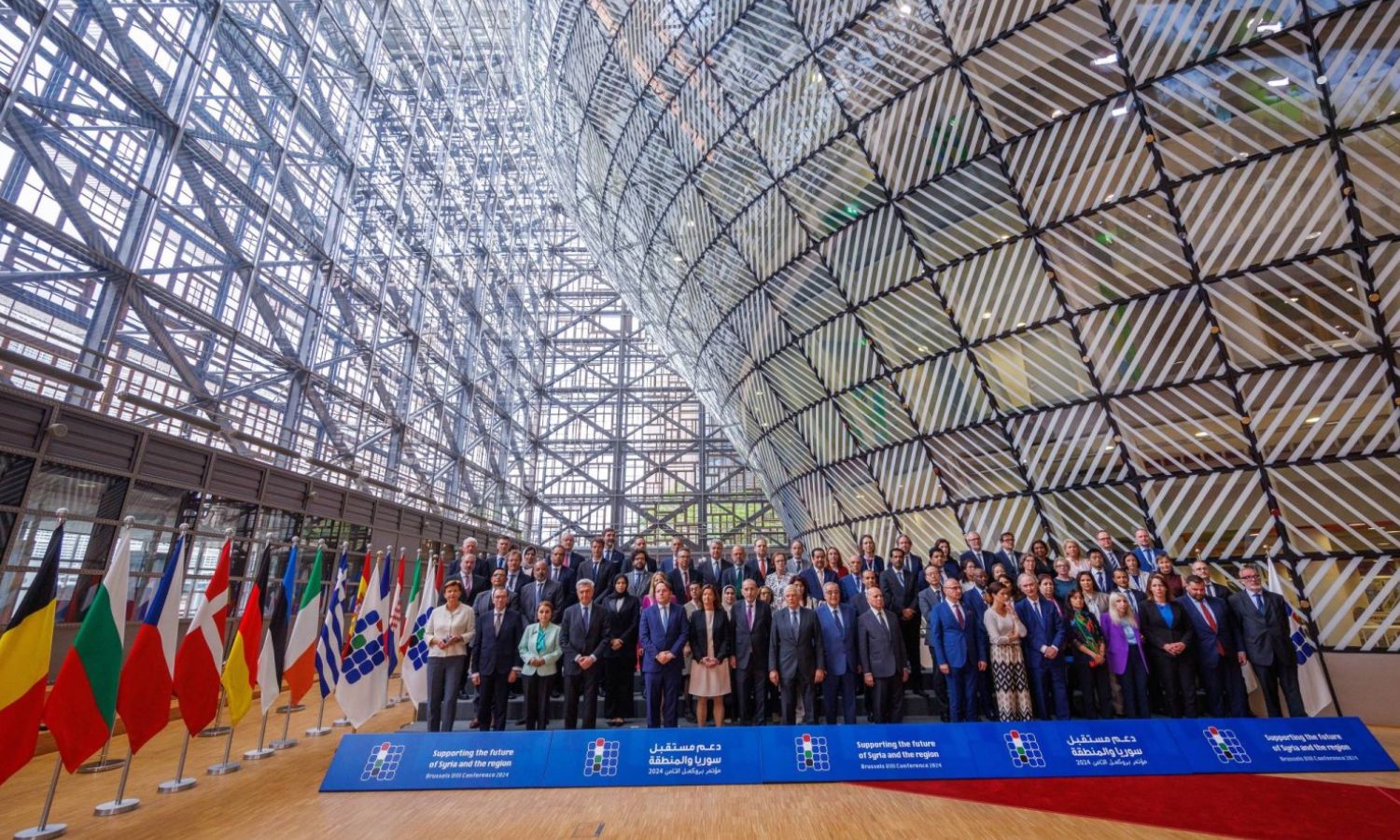





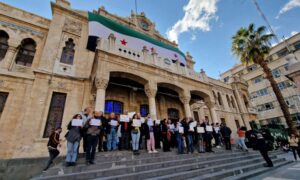
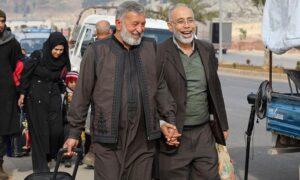
 More In-Depth
More In-Depth